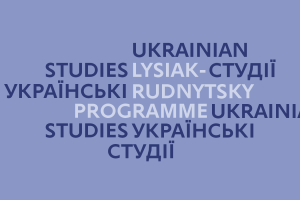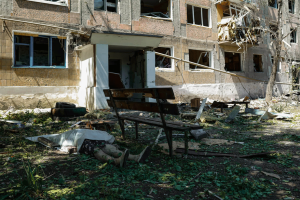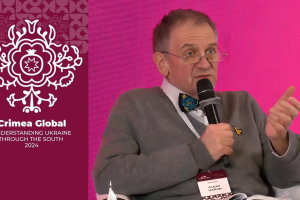Success of reforms in Ukraine rated 2,66 on a five-point scale – opinion poll

Civil society actors present the survey results on how experts and the wider public assess the success of reforms’ implementation in the country over the past three years.
On average, the success of reforms in Ukraine was given 2,66 points on the five-point scale. That’s how the experts – members of the organizations that are part of the Reanimation Package of Reforms (RPR) assess the reform implementation process in Ukraine. The survey was conducted by the Ilko Kucheriv Democratic Initiatives Foundation together with the RPR Secretariat on November 24-28, 2017. Sixty experts were interviewed in course of the polling. The Ilko Kucheriv Democratic Initiatives Foundation also conducted a public opinion poll.

“People show little enthusiasm about the reforms – according to both the expert assessment and the public opinion. Experts note particular developments, and the majority of them are of the opinion that less than a half of all the necessary reforms have been implemented,” said Andriy Sukharyna, a political analyst at the Ilko Kucheriv Democratic Initiatives Foundation presenting the research results at Ukraine Crisis Media Center.
What do the experts think?
Among the main achievements, the experts name the start of decentralization, medical reform, the work of anti-corruption agencies, developments in the education reform, and the start of the judicial reform. According to the experts, most problematic reforms are law enforcement, judiciary, internal affairs, prosecutor’s office, and anti-corruption reforms as well as the lack of progress with the election reform. According to the experts, civil service reform is less problematic.
According to the experts, obstacles to reforming in Ukraine prevail over those who are the driving force behind the reforms. The experts almost unanimously name the civil society and the western states the driving force, however, assessing the role of the state rather positively than negatively. The majority of experts think that the President and the parliamentary coalition are back-pedaling the changes rather than moving them forward. Oligarchs, bureaucracy, and law enforcement were named the biggest opponents to the reforms.
The majority of the interviewees emphasized that the priority reforms are the ones that are not successful at the moment – law enforcement, anti-corruption, and governance reform. As priority steps, the experts name the start of the actual fight against corruption, in particular, the launch of the anti-corruption court, renewal of judiciary and finalizing the law enforcement reform.
What do the people think?
Over 40 percent of respondents are of the opinion that no success at all has been achieved. About 35 percent think that 10 percent of the necessary reforms have been accomplished; a little bit more than 10 percent – that one-third of all the necessary changes have been made. Twenty-seven percent of respondents believe in the success of reforms. Less than one-third of respondents claimed ready to tolerate the hardships for the sake of the reform success. However, only 25 percent consider protests possible in their cities. “There is a problem of paternalism: the majority of Ukrainians are of the opinion that the state has to take up a considerable part of responsibilities to provide a certain living standard; they thus support to a lesser extent individual freedom and accept exchanging it into some tangible assets,” Andriy Sukharyna noted.
In the public opinion, biggest opponents to the reforms are civil servants, oligarchs, the government, and the President. As to the two latter ones, the public opinion split: about 50 percent consider them to be an obstacle for the changes, while 50 percent, on the contrary, think they can be the driving force behind the reforms. People are most hopeful for the civil society organizations and the western states, Andriy Sukharyna summarized.
The majority of the experts think that one of the reasons why the wider society assesses reforms in such a way is the lack of quality reform communication; public opinion polls demonstrate a similar result. People do not understand what exactly will change and what advantages it will give them, they often do not trust the information they get, because what they see around does not sit well with officials’ statements. According to Andriy Sukharyna, the second reason why the reform assessment is mainly negative is that the majority of people think that corruption is the main problem, but see no considerable changes in this direction.
Experts’ commentary

Mykhailo Zhernakov, Director of the DEJURE Foundation, the leading expert on the judicial reform at the Reanimation Package of Reforms, noted that he is most impressed with the difference between the numbers of the experts and common people who see no progress in reforming – one and 40 percent respectively. “It may be explained by the fact that the experts see more as a result of their professional activities, but the fact that people do not believe in the reform success at all points at the lack of communication – people just don’t see it,” he noted. Mykhailo Zhernakov also pointed to the fact that the start of the judicial reform is being classified as a success, while the overall reform progress – as a failure. “These figures demonstrate the huge difference between what is on the paper, in the Constitution, and what’s been implemented. […] The fact that top politicians including the President can say things that do not correspond to the facts [on the judicial reform] demonstrates that people are little aware of the judicial reform implementation details,” he emphasized.

Ihor Burakovskyi, Chairman of the Board of the Institute for Economic Research and Policy Consulting, member of the Board of the Reanimation Package of Reforms, points that the key decision to kick-start the reforms have been made in some fields. These are the medical and education reforms, as well as the budget process. However, the point of no return has not been reached and it is the biggest threat. “It is very important to continue the reforms. We need to understand that the time of changes is the most complicated. We expect to get a magic wand: a decision is adopted and economic growth starts immediately. But it is not like that. If we look at the time that reforms took in other countries, they were not made in a year or two,” Burakovsky noted. “We often think that if the policies are correct, everything else appears automatically. But it’s not true. To make Ukraine successful […] the state, business and the society altogether need to be moving towards increasing efficiency of their activities and work. It is the key aspect in my opinion,” he emphasized.
“The dynamics are not bad. It has surely slowed down in the third year of decisive reforms, but it’s logical. The society is tired, and this shows in all the opinion polls. […] If we manage not to cut but to step up the pace, there are all chances that in five-seven years – the time that took the countries comparable to Ukraine to reform, like Poland or the Czech Republic, we will be able to achieve if not the average European level than the average international level definitely.

We need to also explain it to the society because the considerable number of problems that we have is due to high expectations,” said Yaroslav Yurchyshyn, Executive Director of Transparency International Ukraine, Co-chairman of the Board of the Reanimation Package of Reforms.








